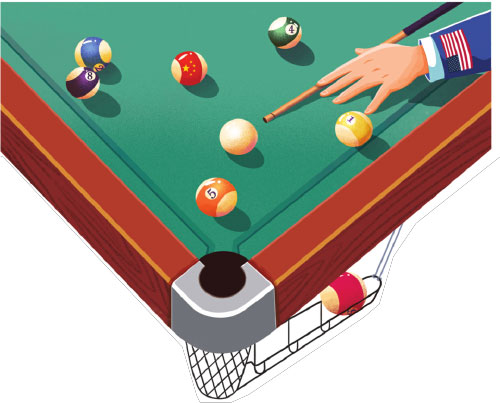US the real revisionist power
Claim that a rising China wants to replace the existing rules-based international order with one of its own does not hold water
In the Shangri-La Dialogue in Singapore in June 2019, defense ministers from the United States and China spoke about the best way forward for international relations in the Asia-Pacific (or Indo-Pacific as the US now insists on calling it).
Acting US Defense Secretary Patrick Shanahan, echoing the Defense Department's Indo-Pacific Strategy Report, which identifies China as a revisionist power, warned Asian countries that the greatest long-term threat to their safety and prosperity would be a rising power which seeks to undermine the rules-based international order, in an apparent reference to China.
While Chinese Defense Minister Wei Fenghe in his speech worked hard to reassure his audience that China intends to pursue peaceful development and does not seek hegemony, while warning the United States not to interfere in the Taiwan question.
At the heart of this debate is what kind of international order should govern international relations in Asia.
Countries in this region are used to the international order that was established after World War II, which on the whole has maintained peace and security, general adherence to international law and the peaceful resolution of disputes, openness to international trade and investment and the freedom of overflight and navigation under international law, among others. Shanahan emphasized all these principles in his speech in Singapore. He further stated that the US would maintain this order "with strength" and called on other Asian countries to work with the US to contain "revisionist powers".
The problem with the conventional wisdom that a rising China is a challenger to the post-World War II international order and now desires to replace this order with one of its own does not hold water. This is a misunderstanding about the direction of China's development path for three reasons.
First, it is difficult to believe that China, a country which has been regarded as one of the largest beneficiaries of the postwar international order, would want to overturn that order. The post-World War II peace and security arrangements, which are largely maintained by the contemporary system of international law, has created an environment for China's peaceful development. The free trade system under the umbrella of Bretton Woods institutions has guaranteed China access to global markets, capital and technology. Chinese leaders have repeatedly stated that China accepts and even seeks to safeguard the international order. One should not doubt the sincerity of these statements.
Second, although China's approach to the international order in Asia and elsewhere is different from that of the US, it does not necessarily challenge the international order. For instance, on the security order in Asia, China has advanced a security concept which advocates consultation and dialogue, openness, inclusiveness, and win-win cooperation, in addition to partnership - not alliance - building. If the US "principled network" can be characterized as a "power plus rules" approach, the Chinese way is clearly a "relations building" approach, which is disinterested in making laws and subjecting state-to-state relations to binding rules. Rather, it aims to maintain harmonious long-term bilateral relations between China and other states.
Despite the Chinese enthusiasm in establishing and maintaining relations, it does not however pose any immediate and frontal challenge to the existing rules-based international order, as it also advocates that such relations be consistent with regional and international norms. That is to say, China's approach is framed under the rules and spirit of the international order.
It is important to point out that the difference between the US approach and Chinese approach is the US places more emphasize on rules and values, because the framework of rules has been designed by the US in its favor and imposed on Asian countries. China's approach, on the other hand, puts more weight on building friendly relations and pursuing common development, in order to achieve mutual benefits and wide participation among the countries concerned.
The third reason begs us not to confuse challenging the international order with pursuing wealth, power and influence. The international order does not prohibit countries from becoming stronger, richer and more advanced than other countries. So a rising state's pursuit of power and global status, if done within the framework of the current international order, should not be automatically viewed as a challenge to the order per se. This requires one to distinguish between a challenge to the norms of the international order and a challenge to the dominant position of the status quo power in the international system.
If a rising power questions and would like to change the prevailing norms of the international order, which currently include non-discrimination-based free trade, rules-based state relations and the peaceful resolution of disputes that can be considered as challenging the international order.
However, if the rising power aims at becoming a more important or even a dominant player in the international system, and in so doing replacing the dominant position of an existing power, as long as the rising power still follows internationally recognized rules and customs, its rise is not a challenge to the world order.
Going back to the ongoing US-China rivalry, one should not simply accept the US accusations against China and take it for granted that China is an outlier to the international order under the framework of international law. There is nothing to suggest China is in the process of overturning the international order. In fact, the international order's biggest threat today is the current US administration, which has endangered the rules-based international order to an unprecedented extent.
The author is a visiting research fellow in Grandview Institution and the associate professor at the faculty of law in National University of Singapore. The author contributed this article to China Watch, a think tank powered by China Daily. The views do not necessarily reflect those of China Daily.

(China Daily Global 06/17/2019 page13)


















